The "GR-PEACH_Audio_Playback_Sample" is a sample code that can provides high-resolution audio playback of FLAC format files. It also allows the user to audio-playback control functions such as play, pause, and stop by manipulating key switches.
Dependencies: R_BSP TLV320_RBSP USBHost_custom
Note
For a sample program of with LCD Board,
please refer to GR-PEACH_Audio_Playback_7InchLCD_Sample.
Introduction
The "GR-PEACH_Audio_Playback_Sample" is a sample code that can provides high-resolution audio playback of FLAC format files. It also allows the user to audio-playback control functions such as play, pause, and stop by manipulating key switches.
1. Overview of the Sample Code
1.1 Software Block Diagram
Figure 1.1 shows the software block diagram.
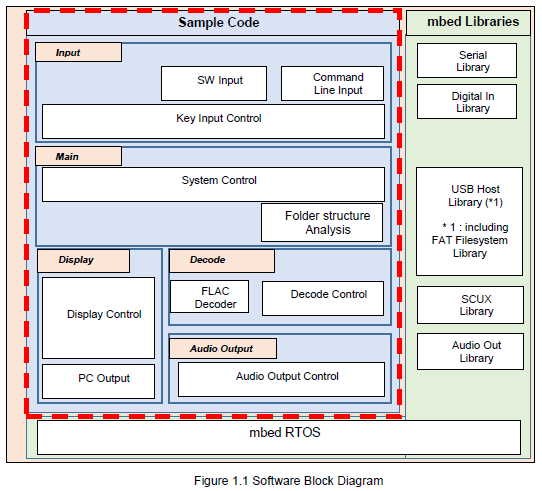
1.2 Pin Definitions
Table 1.1 shows the pins that this sample code are to use.
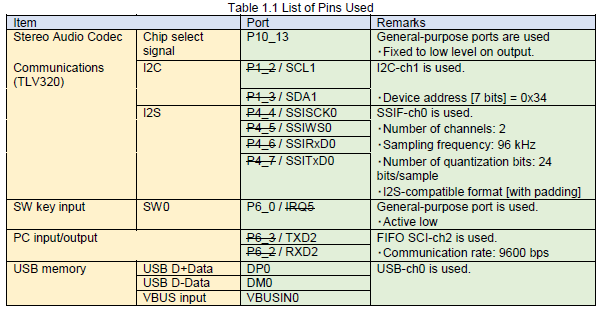
2. Sample Code Operating Environment
This sample code runs in GR-PEACH + the Audio/Camera shield for the GR-PEACH environment. This section explains the functions of the ports that are used by this sample code.
2.1 Operating Environment
Figure 2.1 shows the configuration of the operating environment for running this sample code.
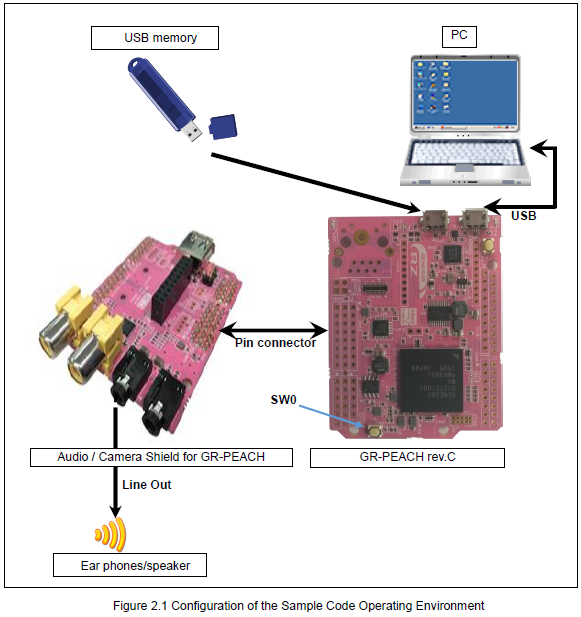
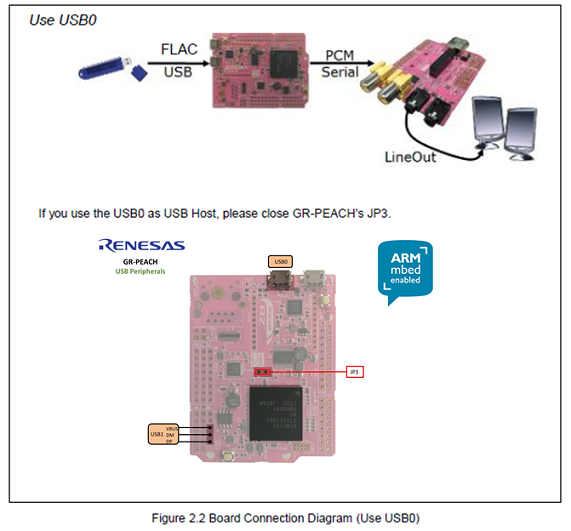
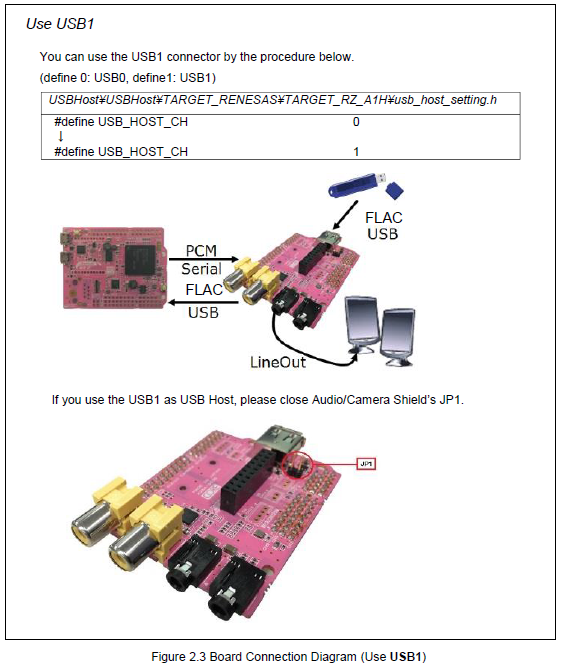
2.2 List of User Operations
A list of user operations on the command line, TFT touch keys, and switch key that the user can perform for this sample code is shown in. Table 2.1.

3. Function Outline
The functions of this sample code are summarized in Table 3.1 to Table 3.3.
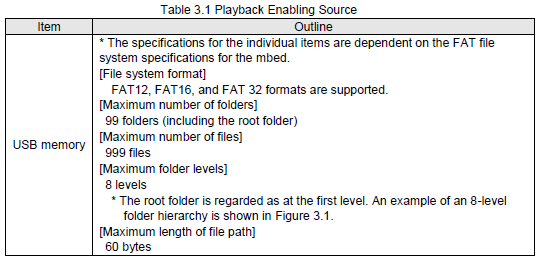
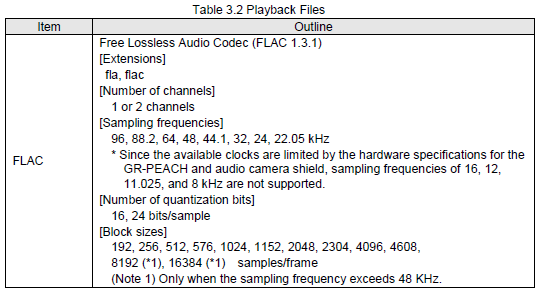
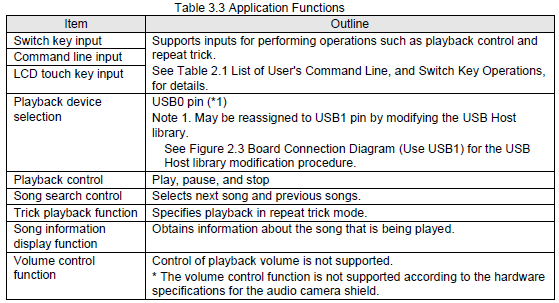
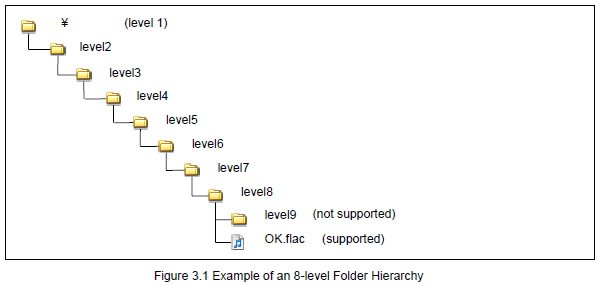
3.1 Playback Control
The playback control that the sample code supports include play, pause, stop, skip to next, and skip to previous.
3.2 Trick Play Control
Manipulating "Repeat" alternates between "Repeat mode On" and "Repeat mode Off". The default mode is "Repeat mode On". When the repeat mode is on, the playback of the first song starts after the playback of the last song is finished. When the repeat mode is off, the sample code enters the stopped state after the playback of the last song is finished.
3.3 Acquisition of the Song Information
The information of the song being played is obtained by operating the "Play info" during the playback of the song. Table 3.4 lists the items of information that can be obtained by the "Play info" operation.

3.4 How the Folder Structure is Analyzed
The sample coded analyzes the folder structure in the breadth-first search order. The order in which files are numbered is illustrated in Table 3.5. The sample code does not sort the files by file or folder name.
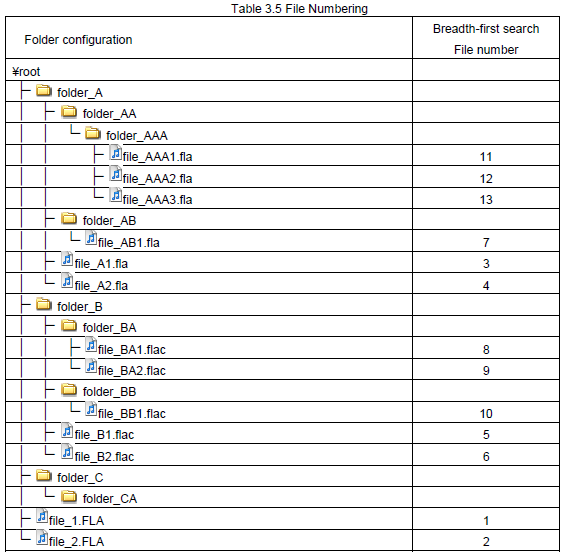
4.Others
The default setting of serial communication (baud rate etc.) in mbed is shown the following link.
Please refer to the link and change the settings of your PC terminal software.
The default value of baud rate in mbed is 9600, and this application uses baud rate 9600.
https://developer.mbed.org/teams/Renesas/wiki/GR-PEACH-Getting-Started#install-the-usb-serial-communication
flac/include/FLAC/stream_decoder.h
- Committer:
- Osamu Nakamura
- Date:
- 2017-03-31
- Revision:
- 6:df19c3e787ca
- Parent:
- 0:ee40da884cfc
File content as of revision 6:df19c3e787ca:
/* libFLAC - Free Lossless Audio Codec library
* Copyright (C) 2000-2009 Josh Coalson
* Copyright (C) 2011-2014 Xiph.Org Foundation
*
* Redistribution and use in source and binary forms, with or without
* modification, are permitted provided that the following conditions
* are met:
*
* - Redistributions of source code must retain the above copyright
* notice, this list of conditions and the following disclaimer.
*
* - Redistributions in binary form must reproduce the above copyright
* notice, this list of conditions and the following disclaimer in the
* documentation and/or other materials provided with the distribution.
*
* - Neither the name of the Xiph.org Foundation nor the names of its
* contributors may be used to endorse or promote products derived from
* this software without specific prior written permission.
*
* THIS SOFTWARE IS PROVIDED BY THE COPYRIGHT HOLDERS AND CONTRIBUTORS
* ``AS IS'' AND ANY EXPRESS OR IMPLIED WARRANTIES, INCLUDING, BUT NOT
* LIMITED TO, THE IMPLIED WARRANTIES OF MERCHANTABILITY AND FITNESS FOR
* A PARTICULAR PURPOSE ARE DISCLAIMED. IN NO EVENT SHALL THE FOUNDATION OR
* CONTRIBUTORS BE LIABLE FOR ANY DIRECT, INDIRECT, INCIDENTAL, SPECIAL,
* EXEMPLARY, OR CONSEQUENTIAL DAMAGES (INCLUDING, BUT NOT LIMITED TO,
* PROCUREMENT OF SUBSTITUTE GOODS OR SERVICES; LOSS OF USE, DATA, OR
* PROFITS; OR BUSINESS INTERRUPTION) HOWEVER CAUSED AND ON ANY THEORY OF
* LIABILITY, WHETHER IN CONTRACT, STRICT LIABILITY, OR TORT (INCLUDING
* NEGLIGENCE OR OTHERWISE) ARISING IN ANY WAY OUT OF THE USE OF THIS
* SOFTWARE, EVEN IF ADVISED OF THE POSSIBILITY OF SUCH DAMAGE.
*/
#ifndef FLAC__STREAM_DECODER_H
#define FLAC__STREAM_DECODER_H
#include <stdio.h> /* for FILE */
#include "export.h"
#include "format.h"
#ifdef __cplusplus
extern "C" {
#endif
/** \file include/FLAC/stream_decoder.h
*
* \brief
* This module contains the functions which implement the stream
* decoder.
*
* See the detailed documentation in the
* \link flac_stream_decoder stream decoder \endlink module.
*/
/** \defgroup flac_decoder FLAC/ \*_decoder.h: decoder interfaces
* \ingroup flac
*
* \brief
* This module describes the decoder layers provided by libFLAC.
*
* The stream decoder can be used to decode complete streams either from
* the client via callbacks, or directly from a file, depending on how
* it is initialized. When decoding via callbacks, the client provides
* callbacks for reading FLAC data and writing decoded samples, and
* handling metadata and errors. If the client also supplies seek-related
* callback, the decoder function for sample-accurate seeking within the
* FLAC input is also available. When decoding from a file, the client
* needs only supply a filename or open \c FILE* and write/metadata/error
* callbacks; the rest of the callbacks are supplied internally. For more
* info see the \link flac_stream_decoder stream decoder \endlink module.
*/
/** \defgroup flac_stream_decoder FLAC/stream_decoder.h: stream decoder interface
* \ingroup flac_decoder
*
* \brief
* This module contains the functions which implement the stream
* decoder.
*
* The stream decoder can decode native FLAC, and optionally Ogg FLAC
* (check FLAC_API_SUPPORTS_OGG_FLAC) streams and files.
*
* The basic usage of this decoder is as follows:
* - The program creates an instance of a decoder using
* FLAC__stream_decoder_new().
* - The program overrides the default settings using
* FLAC__stream_decoder_set_*() functions.
* - The program initializes the instance to validate the settings and
* prepare for decoding using
* - FLAC__stream_decoder_init_stream() or FLAC__stream_decoder_init_FILE()
* or FLAC__stream_decoder_init_file() for native FLAC,
* - FLAC__stream_decoder_init_ogg_stream() or FLAC__stream_decoder_init_ogg_FILE()
* or FLAC__stream_decoder_init_ogg_file() for Ogg FLAC
* - The program calls the FLAC__stream_decoder_process_*() functions
* to decode data, which subsequently calls the callbacks.
* - The program finishes the decoding with FLAC__stream_decoder_finish(),
* which flushes the input and output and resets the decoder to the
* uninitialized state.
* - The instance may be used again or deleted with
* FLAC__stream_decoder_delete().
*
* In more detail, the program will create a new instance by calling
* FLAC__stream_decoder_new(), then call FLAC__stream_decoder_set_*()
* functions to override the default decoder options, and call
* one of the FLAC__stream_decoder_init_*() functions.
*
* There are three initialization functions for native FLAC, one for
* setting up the decoder to decode FLAC data from the client via
* callbacks, and two for decoding directly from a FLAC file.
*
* For decoding via callbacks, use FLAC__stream_decoder_init_stream().
* You must also supply several callbacks for handling I/O. Some (like
* seeking) are optional, depending on the capabilities of the input.
*
* For decoding directly from a file, use FLAC__stream_decoder_init_FILE()
* or FLAC__stream_decoder_init_file(). Then you must only supply an open
* \c FILE* or filename and fewer callbacks; the decoder will handle
* the other callbacks internally.
*
* There are three similarly-named init functions for decoding from Ogg
* FLAC streams. Check \c FLAC_API_SUPPORTS_OGG_FLAC to find out if the
* library has been built with Ogg support.
*
* Once the decoder is initialized, your program will call one of several
* functions to start the decoding process:
*
* - FLAC__stream_decoder_process_single() - Tells the decoder to process at
* most one metadata block or audio frame and return, calling either the
* metadata callback or write callback, respectively, once. If the decoder
* loses sync it will return with only the error callback being called.
* - FLAC__stream_decoder_process_until_end_of_metadata() - Tells the decoder
* to process the stream from the current location and stop upon reaching
* the first audio frame. The client will get one metadata, write, or error
* callback per metadata block, audio frame, or sync error, respectively.
* - FLAC__stream_decoder_process_until_end_of_stream() - Tells the decoder
* to process the stream from the current location until the read callback
* returns FLAC__STREAM_DECODER_READ_STATUS_END_OF_STREAM or
* FLAC__STREAM_DECODER_READ_STATUS_ABORT. The client will get one metadata,
* write, or error callback per metadata block, audio frame, or sync error,
* respectively.
*
* When the decoder has finished decoding (normally or through an abort),
* the instance is finished by calling FLAC__stream_decoder_finish(), which
* ensures the decoder is in the correct state and frees memory. Then the
* instance may be deleted with FLAC__stream_decoder_delete() or initialized
* again to decode another stream.
*
* Seeking is exposed through the FLAC__stream_decoder_seek_absolute() method.
* At any point after the stream decoder has been initialized, the client can
* call this function to seek to an exact sample within the stream.
* Subsequently, the first time the write callback is called it will be
* passed a (possibly partial) block starting at that sample.
*
* If the client cannot seek via the callback interface provided, but still
* has another way of seeking, it can flush the decoder using
* FLAC__stream_decoder_flush() and start feeding data from the new position
* through the read callback.
*
* The stream decoder also provides MD5 signature checking. If this is
* turned on before initialization, FLAC__stream_decoder_finish() will
* report when the decoded MD5 signature does not match the one stored
* in the STREAMINFO block. MD5 checking is automatically turned off
* (until the next FLAC__stream_decoder_reset()) if there is no signature
* in the STREAMINFO block or when a seek is attempted.
*
* The FLAC__stream_decoder_set_metadata_*() functions deserve special
* attention. By default, the decoder only calls the metadata_callback for
* the STREAMINFO block. These functions allow you to tell the decoder
* explicitly which blocks to parse and return via the metadata_callback
* and/or which to skip. Use a FLAC__stream_decoder_set_metadata_respond_all(),
* FLAC__stream_decoder_set_metadata_ignore() ... or FLAC__stream_decoder_set_metadata_ignore_all(),
* FLAC__stream_decoder_set_metadata_respond() ... sequence to exactly specify
* which blocks to return. Remember that metadata blocks can potentially
* be big (for example, cover art) so filtering out the ones you don't
* use can reduce the memory requirements of the decoder. Also note the
* special forms FLAC__stream_decoder_set_metadata_respond_application(id)
* and FLAC__stream_decoder_set_metadata_ignore_application(id) for
* filtering APPLICATION blocks based on the application ID.
*
* STREAMINFO and SEEKTABLE blocks are always parsed and used internally, but
* they still can legally be filtered from the metadata_callback.
*
* \note
* The "set" functions may only be called when the decoder is in the
* state FLAC__STREAM_DECODER_UNINITIALIZED, i.e. after
* FLAC__stream_decoder_new() or FLAC__stream_decoder_finish(), but
* before FLAC__stream_decoder_init_*(). If this is the case they will
* return \c true, otherwise \c false.
*
* \note
* FLAC__stream_decoder_finish() resets all settings to the constructor
* defaults, including the callbacks.
*
* \{
*/
/** State values for a FLAC__StreamDecoder
*
* The decoder's state can be obtained by calling FLAC__stream_decoder_get_state().
*/
typedef enum {
FLAC__STREAM_DECODER_SEARCH_FOR_METADATA = 0,
/**< The decoder is ready to search for metadata. */
FLAC__STREAM_DECODER_READ_METADATA,
/**< The decoder is ready to or is in the process of reading metadata. */
FLAC__STREAM_DECODER_SEARCH_FOR_FRAME_SYNC,
/**< The decoder is ready to or is in the process of searching for the
* frame sync code.
*/
FLAC__STREAM_DECODER_READ_FRAME,
/**< The decoder is ready to or is in the process of reading a frame. */
FLAC__STREAM_DECODER_END_OF_STREAM,
/**< The decoder has reached the end of the stream. */
FLAC__STREAM_DECODER_OGG_ERROR,
/**< An error occurred in the underlying Ogg layer. */
FLAC__STREAM_DECODER_SEEK_ERROR,
/**< An error occurred while seeking. The decoder must be flushed
* with FLAC__stream_decoder_flush() or reset with
* FLAC__stream_decoder_reset() before decoding can continue.
*/
FLAC__STREAM_DECODER_ABORTED,
/**< The decoder was aborted by the read callback. */
FLAC__STREAM_DECODER_MEMORY_ALLOCATION_ERROR,
/**< An error occurred allocating memory. The decoder is in an invalid
* state and can no longer be used.
*/
FLAC__STREAM_DECODER_UNINITIALIZED
/**< The decoder is in the uninitialized state; one of the
* FLAC__stream_decoder_init_*() functions must be called before samples
* can be processed.
*/
} FLAC__StreamDecoderState;
/** Maps a FLAC__StreamDecoderState to a C string.
*
* Using a FLAC__StreamDecoderState as the index to this array
* will give the string equivalent. The contents should not be modified.
*/
extern FLAC_API const char * const FLAC__StreamDecoderStateString[];
/** Possible return values for the FLAC__stream_decoder_init_*() functions.
*/
typedef enum {
FLAC__STREAM_DECODER_INIT_STATUS_OK = 0,
/**< Initialization was successful. */
FLAC__STREAM_DECODER_INIT_STATUS_UNSUPPORTED_CONTAINER,
/**< The library was not compiled with support for the given container
* format.
*/
FLAC__STREAM_DECODER_INIT_STATUS_INVALID_CALLBACKS,
/**< A required callback was not supplied. */
FLAC__STREAM_DECODER_INIT_STATUS_MEMORY_ALLOCATION_ERROR,
/**< An error occurred allocating memory. */
FLAC__STREAM_DECODER_INIT_STATUS_ERROR_OPENING_FILE,
/**< fopen() failed in FLAC__stream_decoder_init_file() or
* FLAC__stream_decoder_init_ogg_file(). */
FLAC__STREAM_DECODER_INIT_STATUS_ALREADY_INITIALIZED
/**< FLAC__stream_decoder_init_*() was called when the decoder was
* already initialized, usually because
* FLAC__stream_decoder_finish() was not called.
*/
} FLAC__StreamDecoderInitStatus;
/** Maps a FLAC__StreamDecoderInitStatus to a C string.
*
* Using a FLAC__StreamDecoderInitStatus as the index to this array
* will give the string equivalent. The contents should not be modified.
*/
extern FLAC_API const char * const FLAC__StreamDecoderInitStatusString[];
/** Return values for the FLAC__StreamDecoder read callback.
*/
typedef enum {
FLAC__STREAM_DECODER_READ_STATUS_CONTINUE,
/**< The read was OK and decoding can continue. */
FLAC__STREAM_DECODER_READ_STATUS_END_OF_STREAM,
/**< The read was attempted while at the end of the stream. Note that
* the client must only return this value when the read callback was
* called when already at the end of the stream. Otherwise, if the read
* itself moves to the end of the stream, the client should still return
* the data and \c FLAC__STREAM_DECODER_READ_STATUS_CONTINUE, and then on
* the next read callback it should return
* \c FLAC__STREAM_DECODER_READ_STATUS_END_OF_STREAM with a byte count
* of \c 0.
*/
FLAC__STREAM_DECODER_READ_STATUS_ABORT
/**< An unrecoverable error occurred. The decoder will return from the process call. */
} FLAC__StreamDecoderReadStatus;
/** Maps a FLAC__StreamDecoderReadStatus to a C string.
*
* Using a FLAC__StreamDecoderReadStatus as the index to this array
* will give the string equivalent. The contents should not be modified.
*/
extern FLAC_API const char * const FLAC__StreamDecoderReadStatusString[];
/** Return values for the FLAC__StreamDecoder seek callback.
*/
typedef enum {
FLAC__STREAM_DECODER_SEEK_STATUS_OK,
/**< The seek was OK and decoding can continue. */
FLAC__STREAM_DECODER_SEEK_STATUS_ERROR,
/**< An unrecoverable error occurred. The decoder will return from the process call. */
FLAC__STREAM_DECODER_SEEK_STATUS_UNSUPPORTED
/**< Client does not support seeking. */
} FLAC__StreamDecoderSeekStatus;
/** Maps a FLAC__StreamDecoderSeekStatus to a C string.
*
* Using a FLAC__StreamDecoderSeekStatus as the index to this array
* will give the string equivalent. The contents should not be modified.
*/
extern FLAC_API const char * const FLAC__StreamDecoderSeekStatusString[];
/** Return values for the FLAC__StreamDecoder tell callback.
*/
typedef enum {
FLAC__STREAM_DECODER_TELL_STATUS_OK,
/**< The tell was OK and decoding can continue. */
FLAC__STREAM_DECODER_TELL_STATUS_ERROR,
/**< An unrecoverable error occurred. The decoder will return from the process call. */
FLAC__STREAM_DECODER_TELL_STATUS_UNSUPPORTED
/**< Client does not support telling the position. */
} FLAC__StreamDecoderTellStatus;
/** Maps a FLAC__StreamDecoderTellStatus to a C string.
*
* Using a FLAC__StreamDecoderTellStatus as the index to this array
* will give the string equivalent. The contents should not be modified.
*/
extern FLAC_API const char * const FLAC__StreamDecoderTellStatusString[];
/** Return values for the FLAC__StreamDecoder length callback.
*/
typedef enum {
FLAC__STREAM_DECODER_LENGTH_STATUS_OK,
/**< The length call was OK and decoding can continue. */
FLAC__STREAM_DECODER_LENGTH_STATUS_ERROR,
/**< An unrecoverable error occurred. The decoder will return from the process call. */
FLAC__STREAM_DECODER_LENGTH_STATUS_UNSUPPORTED
/**< Client does not support reporting the length. */
} FLAC__StreamDecoderLengthStatus;
/** Maps a FLAC__StreamDecoderLengthStatus to a C string.
*
* Using a FLAC__StreamDecoderLengthStatus as the index to this array
* will give the string equivalent. The contents should not be modified.
*/
extern FLAC_API const char * const FLAC__StreamDecoderLengthStatusString[];
/** Return values for the FLAC__StreamDecoder write callback.
*/
typedef enum {
FLAC__STREAM_DECODER_WRITE_STATUS_CONTINUE,
/**< The write was OK and decoding can continue. */
FLAC__STREAM_DECODER_WRITE_STATUS_ABORT
/**< An unrecoverable error occurred. The decoder will return from the process call. */
} FLAC__StreamDecoderWriteStatus;
/** Maps a FLAC__StreamDecoderWriteStatus to a C string.
*
* Using a FLAC__StreamDecoderWriteStatus as the index to this array
* will give the string equivalent. The contents should not be modified.
*/
extern FLAC_API const char * const FLAC__StreamDecoderWriteStatusString[];
/** Possible values passed back to the FLAC__StreamDecoder error callback.
* \c FLAC__STREAM_DECODER_ERROR_STATUS_LOST_SYNC is the generic catch-
* all. The rest could be caused by bad sync (false synchronization on
* data that is not the start of a frame) or corrupted data. The error
* itself is the decoder's best guess at what happened assuming a correct
* sync. For example \c FLAC__STREAM_DECODER_ERROR_STATUS_BAD_HEADER
* could be caused by a correct sync on the start of a frame, but some
* data in the frame header was corrupted. Or it could be the result of
* syncing on a point the stream that looked like the starting of a frame
* but was not. \c FLAC__STREAM_DECODER_ERROR_STATUS_UNPARSEABLE_STREAM
* could be because the decoder encountered a valid frame made by a future
* version of the encoder which it cannot parse, or because of a false
* sync making it appear as though an encountered frame was generated by
* a future encoder.
*/
typedef enum {
FLAC__STREAM_DECODER_ERROR_STATUS_LOST_SYNC,
/**< An error in the stream caused the decoder to lose synchronization. */
FLAC__STREAM_DECODER_ERROR_STATUS_BAD_HEADER,
/**< The decoder encountered a corrupted frame header. */
FLAC__STREAM_DECODER_ERROR_STATUS_FRAME_CRC_MISMATCH,
/**< The frame's data did not match the CRC in the footer. */
FLAC__STREAM_DECODER_ERROR_STATUS_UNPARSEABLE_STREAM
/**< The decoder encountered reserved fields in use in the stream. */
} FLAC__StreamDecoderErrorStatus;
/** Maps a FLAC__StreamDecoderErrorStatus to a C string.
*
* Using a FLAC__StreamDecoderErrorStatus as the index to this array
* will give the string equivalent. The contents should not be modified.
*/
extern FLAC_API const char * const FLAC__StreamDecoderErrorStatusString[];
/***********************************************************************
*
* class FLAC__StreamDecoder
*
***********************************************************************/
struct FLAC__StreamDecoderProtected;
struct FLAC__StreamDecoderPrivate;
/** The opaque structure definition for the stream decoder type.
* See the \link flac_stream_decoder stream decoder module \endlink
* for a detailed description.
*/
typedef struct {
struct FLAC__StreamDecoderProtected *protected_; /* avoid the C++ keyword 'protected' */
struct FLAC__StreamDecoderPrivate *private_; /* avoid the C++ keyword 'private' */
} FLAC__StreamDecoder;
/** Signature for the read callback.
*
* A function pointer matching this signature must be passed to
* FLAC__stream_decoder_init*_stream(). The supplied function will be
* called when the decoder needs more input data. The address of the
* buffer to be filled is supplied, along with the number of bytes the
* buffer can hold. The callback may choose to supply less data and
* modify the byte count but must be careful not to overflow the buffer.
* The callback then returns a status code chosen from
* FLAC__StreamDecoderReadStatus.
*
* Here is an example of a read callback for stdio streams:
* \code
* FLAC__StreamDecoderReadStatus read_cb(const FLAC__StreamDecoder *decoder, FLAC__byte buffer[], size_t *bytes, void *client_data)
* {
* FILE *file = ((MyClientData*)client_data)->file;
* if(*bytes > 0) {
* *bytes = fread(buffer, sizeof(FLAC__byte), *bytes, file);
* if(ferror(file))
* return FLAC__STREAM_DECODER_READ_STATUS_ABORT;
* else if(*bytes == 0)
* return FLAC__STREAM_DECODER_READ_STATUS_END_OF_STREAM;
* else
* return FLAC__STREAM_DECODER_READ_STATUS_CONTINUE;
* }
* else
* return FLAC__STREAM_DECODER_READ_STATUS_ABORT;
* }
* \endcode
*
* \note In general, FLAC__StreamDecoder functions which change the
* state should not be called on the \a decoder while in the callback.
*
* \param decoder The decoder instance calling the callback.
* \param buffer A pointer to a location for the callee to store
* data to be decoded.
* \param bytes A pointer to the size of the buffer. On entry
* to the callback, it contains the maximum number
* of bytes that may be stored in \a buffer. The
* callee must set it to the actual number of bytes
* stored (0 in case of error or end-of-stream) before
* returning.
* \param client_data The callee's client data set through
* FLAC__stream_decoder_init_*().
* \retval FLAC__StreamDecoderReadStatus
* The callee's return status. Note that the callback should return
* \c FLAC__STREAM_DECODER_READ_STATUS_END_OF_STREAM if and only if
* zero bytes were read and there is no more data to be read.
*/
typedef FLAC__StreamDecoderReadStatus (*FLAC__StreamDecoderReadCallback)(const FLAC__StreamDecoder *decoder, FLAC__byte buffer[], size_t *bytes, void *client_data);
/** Signature for the seek callback.
*
* A function pointer matching this signature may be passed to
* FLAC__stream_decoder_init*_stream(). The supplied function will be
* called when the decoder needs to seek the input stream. The decoder
* will pass the absolute byte offset to seek to, 0 meaning the
* beginning of the stream.
*
* Here is an example of a seek callback for stdio streams:
* \code
* FLAC__StreamDecoderSeekStatus seek_cb(const FLAC__StreamDecoder *decoder, FLAC__uint64 absolute_byte_offset, void *client_data)
* {
* FILE *file = ((MyClientData*)client_data)->file;
* if(file == stdin)
* return FLAC__STREAM_DECODER_SEEK_STATUS_UNSUPPORTED;
* else if(fseeko(file, (off_t)absolute_byte_offset, SEEK_SET) < 0)
* return FLAC__STREAM_DECODER_SEEK_STATUS_ERROR;
* else
* return FLAC__STREAM_DECODER_SEEK_STATUS_OK;
* }
* \endcode
*
* \note In general, FLAC__StreamDecoder functions which change the
* state should not be called on the \a decoder while in the callback.
*
* \param decoder The decoder instance calling the callback.
* \param absolute_byte_offset The offset from the beginning of the stream
* to seek to.
* \param client_data The callee's client data set through
* FLAC__stream_decoder_init_*().
* \retval FLAC__StreamDecoderSeekStatus
* The callee's return status.
*/
typedef FLAC__StreamDecoderSeekStatus (*FLAC__StreamDecoderSeekCallback)(const FLAC__StreamDecoder *decoder, FLAC__uint64 absolute_byte_offset, void *client_data);
/** Signature for the tell callback.
*
* A function pointer matching this signature may be passed to
* FLAC__stream_decoder_init*_stream(). The supplied function will be
* called when the decoder wants to know the current position of the
* stream. The callback should return the byte offset from the
* beginning of the stream.
*
* Here is an example of a tell callback for stdio streams:
* \code
* FLAC__StreamDecoderTellStatus tell_cb(const FLAC__StreamDecoder *decoder, FLAC__uint64 *absolute_byte_offset, void *client_data)
* {
* FILE *file = ((MyClientData*)client_data)->file;
* off_t pos;
* if(file == stdin)
* return FLAC__STREAM_DECODER_TELL_STATUS_UNSUPPORTED;
* else if((pos = ftello(file)) < 0)
* return FLAC__STREAM_DECODER_TELL_STATUS_ERROR;
* else {
* *absolute_byte_offset = (FLAC__uint64)pos;
* return FLAC__STREAM_DECODER_TELL_STATUS_OK;
* }
* }
* \endcode
*
* \note In general, FLAC__StreamDecoder functions which change the
* state should not be called on the \a decoder while in the callback.
*
* \param decoder The decoder instance calling the callback.
* \param absolute_byte_offset A pointer to storage for the current offset
* from the beginning of the stream.
* \param client_data The callee's client data set through
* FLAC__stream_decoder_init_*().
* \retval FLAC__StreamDecoderTellStatus
* The callee's return status.
*/
typedef FLAC__StreamDecoderTellStatus (*FLAC__StreamDecoderTellCallback)(const FLAC__StreamDecoder *decoder, FLAC__uint64 *absolute_byte_offset, void *client_data);
/** Signature for the length callback.
*
* A function pointer matching this signature may be passed to
* FLAC__stream_decoder_init*_stream(). The supplied function will be
* called when the decoder wants to know the total length of the stream
* in bytes.
*
* Here is an example of a length callback for stdio streams:
* \code
* FLAC__StreamDecoderLengthStatus length_cb(const FLAC__StreamDecoder *decoder, FLAC__uint64 *stream_length, void *client_data)
* {
* FILE *file = ((MyClientData*)client_data)->file;
* struct stat filestats;
*
* if(file == stdin)
* return FLAC__STREAM_DECODER_LENGTH_STATUS_UNSUPPORTED;
* else if(fstat(fileno(file), &filestats) != 0)
* return FLAC__STREAM_DECODER_LENGTH_STATUS_ERROR;
* else {
* *stream_length = (FLAC__uint64)filestats.st_size;
* return FLAC__STREAM_DECODER_LENGTH_STATUS_OK;
* }
* }
* \endcode
*
* \note In general, FLAC__StreamDecoder functions which change the
* state should not be called on the \a decoder while in the callback.
*
* \param decoder The decoder instance calling the callback.
* \param stream_length A pointer to storage for the length of the stream
* in bytes.
* \param client_data The callee's client data set through
* FLAC__stream_decoder_init_*().
* \retval FLAC__StreamDecoderLengthStatus
* The callee's return status.
*/
typedef FLAC__StreamDecoderLengthStatus (*FLAC__StreamDecoderLengthCallback)(const FLAC__StreamDecoder *decoder, FLAC__uint64 *stream_length, void *client_data);
/** Signature for the EOF callback.
*
* A function pointer matching this signature may be passed to
* FLAC__stream_decoder_init*_stream(). The supplied function will be
* called when the decoder needs to know if the end of the stream has
* been reached.
*
* Here is an example of a EOF callback for stdio streams:
* FLAC__bool eof_cb(const FLAC__StreamDecoder *decoder, void *client_data)
* \code
* {
* FILE *file = ((MyClientData*)client_data)->file;
* return feof(file)? true : false;
* }
* \endcode
*
* \note In general, FLAC__StreamDecoder functions which change the
* state should not be called on the \a decoder while in the callback.
*
* \param decoder The decoder instance calling the callback.
* \param client_data The callee's client data set through
* FLAC__stream_decoder_init_*().
* \retval FLAC__bool
* \c true if the currently at the end of the stream, else \c false.
*/
typedef FLAC__bool (*FLAC__StreamDecoderEofCallback)(const FLAC__StreamDecoder *decoder, void *client_data);
/** Signature for the write callback.
*
* A function pointer matching this signature must be passed to one of
* the FLAC__stream_decoder_init_*() functions.
* The supplied function will be called when the decoder has decoded a
* single audio frame. The decoder will pass the frame metadata as well
* as an array of pointers (one for each channel) pointing to the
* decoded audio.
*
* \note In general, FLAC__StreamDecoder functions which change the
* state should not be called on the \a decoder while in the callback.
*
* \param decoder The decoder instance calling the callback.
* \param frame The description of the decoded frame. See
* FLAC__Frame.
* \param buffer An array of pointers to decoded channels of data.
* Each pointer will point to an array of signed
* samples of length \a frame->header.blocksize.
* Channels will be ordered according to the FLAC
* specification; see the documentation for the
* <A HREF="../format.html#frame_header">frame header</A>.
* \param client_data The callee's client data set through
* FLAC__stream_decoder_init_*().
* \retval FLAC__StreamDecoderWriteStatus
* The callee's return status.
*/
typedef FLAC__StreamDecoderWriteStatus (*FLAC__StreamDecoderWriteCallback)(const FLAC__StreamDecoder *decoder, const FLAC__Frame *frame, const FLAC__int32 * const buffer[], void *client_data);
/** Signature for the metadata callback.
*
* A function pointer matching this signature must be passed to one of
* the FLAC__stream_decoder_init_*() functions.
* The supplied function will be called when the decoder has decoded a
* metadata block. In a valid FLAC file there will always be one
* \c STREAMINFO block, followed by zero or more other metadata blocks.
* These will be supplied by the decoder in the same order as they
* appear in the stream and always before the first audio frame (i.e.
* write callback). The metadata block that is passed in must not be
* modified, and it doesn't live beyond the callback, so you should make
* a copy of it with FLAC__metadata_object_clone() if you will need it
* elsewhere. Since metadata blocks can potentially be large, by
* default the decoder only calls the metadata callback for the
* \c STREAMINFO block; you can instruct the decoder to pass or filter
* other blocks with FLAC__stream_decoder_set_metadata_*() calls.
*
* \note In general, FLAC__StreamDecoder functions which change the
* state should not be called on the \a decoder while in the callback.
*
* \param decoder The decoder instance calling the callback.
* \param metadata The decoded metadata block.
* \param client_data The callee's client data set through
* FLAC__stream_decoder_init_*().
*/
typedef void (*FLAC__StreamDecoderMetadataCallback)(const FLAC__StreamDecoder *decoder, const FLAC__StreamMetadata *metadata, void *client_data);
/** Signature for the error callback.
*
* A function pointer matching this signature must be passed to one of
* the FLAC__stream_decoder_init_*() functions.
* The supplied function will be called whenever an error occurs during
* decoding.
*
* \note In general, FLAC__StreamDecoder functions which change the
* state should not be called on the \a decoder while in the callback.
*
* \param decoder The decoder instance calling the callback.
* \param status The error encountered by the decoder.
* \param client_data The callee's client data set through
* FLAC__stream_decoder_init_*().
*/
typedef void (*FLAC__StreamDecoderErrorCallback)(const FLAC__StreamDecoder *decoder, FLAC__StreamDecoderErrorStatus status, void *client_data);
/***********************************************************************
*
* Class constructor/destructor
*
***********************************************************************/
/** Create a new stream decoder instance. The instance is created with
* default settings; see the individual FLAC__stream_decoder_set_*()
* functions for each setting's default.
*
* \retval FLAC__StreamDecoder*
* \c NULL if there was an error allocating memory, else the new instance.
*/
FLAC_API FLAC__StreamDecoder *FLAC__stream_decoder_new(void);
/** Free a decoder instance. Deletes the object pointed to by \a decoder.
*
* \param decoder A pointer to an existing decoder.
* \assert
* \code decoder != NULL \endcode
*/
FLAC_API void FLAC__stream_decoder_delete(FLAC__StreamDecoder *decoder);
/***********************************************************************
*
* Public class method prototypes
*
***********************************************************************/
/** Set the serial number for the FLAC stream within the Ogg container.
* The default behavior is to use the serial number of the first Ogg
* page. Setting a serial number here will explicitly specify which
* stream is to be decoded.
*
* \note
* This does not need to be set for native FLAC decoding.
*
* \default \c use serial number of first page
* \param decoder A decoder instance to set.
* \param serial_number See above.
* \assert
* \code decoder != NULL \endcode
* \retval FLAC__bool
* \c false if the decoder is already initialized, else \c true.
*/
FLAC_API FLAC__bool FLAC__stream_decoder_set_ogg_serial_number(FLAC__StreamDecoder *decoder, long serial_number);
/** Set the "MD5 signature checking" flag. If \c true, the decoder will
* compute the MD5 signature of the unencoded audio data while decoding
* and compare it to the signature from the STREAMINFO block, if it
* exists, during FLAC__stream_decoder_finish().
*
* MD5 signature checking will be turned off (until the next
* FLAC__stream_decoder_reset()) if there is no signature in the
* STREAMINFO block or when a seek is attempted.
*
* Clients that do not use the MD5 check should leave this off to speed
* up decoding.
*
* \default \c false
* \param decoder A decoder instance to set.
* \param value Flag value (see above).
* \assert
* \code decoder != NULL \endcode
* \retval FLAC__bool
* \c false if the decoder is already initialized, else \c true.
*/
FLAC_API FLAC__bool FLAC__stream_decoder_set_md5_checking(FLAC__StreamDecoder *decoder, FLAC__bool value);
/** Direct the decoder to pass on all metadata blocks of type \a type.
*
* \default By default, only the \c STREAMINFO block is returned via the
* metadata callback.
* \param decoder A decoder instance to set.
* \param type See above.
* \assert
* \code decoder != NULL \endcode
* \a type is valid
* \retval FLAC__bool
* \c false if the decoder is already initialized, else \c true.
*/
FLAC_API FLAC__bool FLAC__stream_decoder_set_metadata_respond(FLAC__StreamDecoder *decoder, FLAC__MetadataType type);
/** Direct the decoder to pass on all APPLICATION metadata blocks of the
* given \a id.
*
* \default By default, only the \c STREAMINFO block is returned via the
* metadata callback.
* \param decoder A decoder instance to set.
* \param id See above.
* \assert
* \code decoder != NULL \endcode
* \code id != NULL \endcode
* \retval FLAC__bool
* \c false if the decoder is already initialized, else \c true.
*/
FLAC_API FLAC__bool FLAC__stream_decoder_set_metadata_respond_application(FLAC__StreamDecoder *decoder, const FLAC__byte id[4]);
/** Direct the decoder to pass on all metadata blocks of any type.
*
* \default By default, only the \c STREAMINFO block is returned via the
* metadata callback.
* \param decoder A decoder instance to set.
* \assert
* \code decoder != NULL \endcode
* \retval FLAC__bool
* \c false if the decoder is already initialized, else \c true.
*/
FLAC_API FLAC__bool FLAC__stream_decoder_set_metadata_respond_all(FLAC__StreamDecoder *decoder);
/** Direct the decoder to filter out all metadata blocks of type \a type.
*
* \default By default, only the \c STREAMINFO block is returned via the
* metadata callback.
* \param decoder A decoder instance to set.
* \param type See above.
* \assert
* \code decoder != NULL \endcode
* \a type is valid
* \retval FLAC__bool
* \c false if the decoder is already initialized, else \c true.
*/
FLAC_API FLAC__bool FLAC__stream_decoder_set_metadata_ignore(FLAC__StreamDecoder *decoder, FLAC__MetadataType type);
/** Direct the decoder to filter out all APPLICATION metadata blocks of
* the given \a id.
*
* \default By default, only the \c STREAMINFO block is returned via the
* metadata callback.
* \param decoder A decoder instance to set.
* \param id See above.
* \assert
* \code decoder != NULL \endcode
* \code id != NULL \endcode
* \retval FLAC__bool
* \c false if the decoder is already initialized, else \c true.
*/
FLAC_API FLAC__bool FLAC__stream_decoder_set_metadata_ignore_application(FLAC__StreamDecoder *decoder, const FLAC__byte id[4]);
/** Direct the decoder to filter out all metadata blocks of any type.
*
* \default By default, only the \c STREAMINFO block is returned via the
* metadata callback.
* \param decoder A decoder instance to set.
* \assert
* \code decoder != NULL \endcode
* \retval FLAC__bool
* \c false if the decoder is already initialized, else \c true.
*/
FLAC_API FLAC__bool FLAC__stream_decoder_set_metadata_ignore_all(FLAC__StreamDecoder *decoder);
/** Get the current decoder state.
*
* \param decoder A decoder instance to query.
* \assert
* \code decoder != NULL \endcode
* \retval FLAC__StreamDecoderState
* The current decoder state.
*/
FLAC_API FLAC__StreamDecoderState FLAC__stream_decoder_get_state(const FLAC__StreamDecoder *decoder);
/** Get the current decoder state as a C string.
*
* \param decoder A decoder instance to query.
* \assert
* \code decoder != NULL \endcode
* \retval const char *
* The decoder state as a C string. Do not modify the contents.
*/
FLAC_API const char *FLAC__stream_decoder_get_resolved_state_string(const FLAC__StreamDecoder *decoder);
/** Get the "MD5 signature checking" flag.
* This is the value of the setting, not whether or not the decoder is
* currently checking the MD5 (remember, it can be turned off automatically
* by a seek). When the decoder is reset the flag will be restored to the
* value returned by this function.
*
* \param decoder A decoder instance to query.
* \assert
* \code decoder != NULL \endcode
* \retval FLAC__bool
* See above.
*/
FLAC_API FLAC__bool FLAC__stream_decoder_get_md5_checking(const FLAC__StreamDecoder *decoder);
/** Get the total number of samples in the stream being decoded.
* Will only be valid after decoding has started and will contain the
* value from the \c STREAMINFO block. A value of \c 0 means "unknown".
*
* \param decoder A decoder instance to query.
* \assert
* \code decoder != NULL \endcode
* \retval unsigned
* See above.
*/
FLAC_API FLAC__uint64 FLAC__stream_decoder_get_total_samples(const FLAC__StreamDecoder *decoder);
/** Get the current number of channels in the stream being decoded.
* Will only be valid after decoding has started and will contain the
* value from the most recently decoded frame header.
*
* \param decoder A decoder instance to query.
* \assert
* \code decoder != NULL \endcode
* \retval unsigned
* See above.
*/
FLAC_API unsigned FLAC__stream_decoder_get_channels(const FLAC__StreamDecoder *decoder);
/** Get the current channel assignment in the stream being decoded.
* Will only be valid after decoding has started and will contain the
* value from the most recently decoded frame header.
*
* \param decoder A decoder instance to query.
* \assert
* \code decoder != NULL \endcode
* \retval FLAC__ChannelAssignment
* See above.
*/
FLAC_API FLAC__ChannelAssignment FLAC__stream_decoder_get_channel_assignment(const FLAC__StreamDecoder *decoder);
/** Get the current sample resolution in the stream being decoded.
* Will only be valid after decoding has started and will contain the
* value from the most recently decoded frame header.
*
* \param decoder A decoder instance to query.
* \assert
* \code decoder != NULL \endcode
* \retval unsigned
* See above.
*/
FLAC_API unsigned FLAC__stream_decoder_get_bits_per_sample(const FLAC__StreamDecoder *decoder);
/** Get the current sample rate in Hz of the stream being decoded.
* Will only be valid after decoding has started and will contain the
* value from the most recently decoded frame header.
*
* \param decoder A decoder instance to query.
* \assert
* \code decoder != NULL \endcode
* \retval unsigned
* See above.
*/
FLAC_API unsigned FLAC__stream_decoder_get_sample_rate(const FLAC__StreamDecoder *decoder);
/** Get the current blocksize of the stream being decoded.
* Will only be valid after decoding has started and will contain the
* value from the most recently decoded frame header.
*
* \param decoder A decoder instance to query.
* \assert
* \code decoder != NULL \endcode
* \retval unsigned
* See above.
*/
FLAC_API unsigned FLAC__stream_decoder_get_blocksize(const FLAC__StreamDecoder *decoder);
/** Returns the decoder's current read position within the stream.
* The position is the byte offset from the start of the stream.
* Bytes before this position have been fully decoded. Note that
* there may still be undecoded bytes in the decoder's read FIFO.
* The returned position is correct even after a seek.
*
* \warning This function currently only works for native FLAC,
* not Ogg FLAC streams.
*
* \param decoder A decoder instance to query.
* \param position Address at which to return the desired position.
* \assert
* \code decoder != NULL \endcode
* \code position != NULL \endcode
* \retval FLAC__bool
* \c true if successful, \c false if the stream is not native FLAC,
* or there was an error from the 'tell' callback or it returned
* \c FLAC__STREAM_DECODER_TELL_STATUS_UNSUPPORTED.
*/
FLAC_API FLAC__bool FLAC__stream_decoder_get_decode_position(const FLAC__StreamDecoder *decoder, FLAC__uint64 *position);
/** Initialize the decoder instance to decode native FLAC streams.
*
* This flavor of initialization sets up the decoder to decode from a
* native FLAC stream. I/O is performed via callbacks to the client.
* For decoding from a plain file via filename or open FILE*,
* FLAC__stream_decoder_init_file() and FLAC__stream_decoder_init_FILE()
* provide a simpler interface.
*
* This function should be called after FLAC__stream_decoder_new() and
* FLAC__stream_decoder_set_*() but before any of the
* FLAC__stream_decoder_process_*() functions. Will set and return the
* decoder state, which will be FLAC__STREAM_DECODER_SEARCH_FOR_METADATA
* if initialization succeeded.
*
* \param decoder An uninitialized decoder instance.
* \param read_callback See FLAC__StreamDecoderReadCallback. This
* pointer must not be \c NULL.
* \param seek_callback See FLAC__StreamDecoderSeekCallback. This
* pointer may be \c NULL if seeking is not
* supported. If \a seek_callback is not \c NULL then a
* \a tell_callback, \a length_callback, and \a eof_callback must also be supplied.
* Alternatively, a dummy seek callback that just
* returns \c FLAC__STREAM_DECODER_SEEK_STATUS_UNSUPPORTED
* may also be supplied, all though this is slightly
* less efficient for the decoder.
* \param tell_callback See FLAC__StreamDecoderTellCallback. This
* pointer may be \c NULL if not supported by the client. If
* \a seek_callback is not \c NULL then a
* \a tell_callback must also be supplied.
* Alternatively, a dummy tell callback that just
* returns \c FLAC__STREAM_DECODER_TELL_STATUS_UNSUPPORTED
* may also be supplied, all though this is slightly
* less efficient for the decoder.
* \param length_callback See FLAC__StreamDecoderLengthCallback. This
* pointer may be \c NULL if not supported by the client. If
* \a seek_callback is not \c NULL then a
* \a length_callback must also be supplied.
* Alternatively, a dummy length callback that just
* returns \c FLAC__STREAM_DECODER_LENGTH_STATUS_UNSUPPORTED
* may also be supplied, all though this is slightly
* less efficient for the decoder.
* \param eof_callback See FLAC__StreamDecoderEofCallback. This
* pointer may be \c NULL if not supported by the client. If
* \a seek_callback is not \c NULL then a
* \a eof_callback must also be supplied.
* Alternatively, a dummy length callback that just
* returns \c false
* may also be supplied, all though this is slightly
* less efficient for the decoder.
* \param write_callback See FLAC__StreamDecoderWriteCallback. This
* pointer must not be \c NULL.
* \param metadata_callback See FLAC__StreamDecoderMetadataCallback. This
* pointer may be \c NULL if the callback is not
* desired.
* \param error_callback See FLAC__StreamDecoderErrorCallback. This
* pointer must not be \c NULL.
* \param client_data This value will be supplied to callbacks in their
* \a client_data argument.
* \assert
* \code decoder != NULL \endcode
* \retval FLAC__StreamDecoderInitStatus
* \c FLAC__STREAM_DECODER_INIT_STATUS_OK if initialization was successful;
* see FLAC__StreamDecoderInitStatus for the meanings of other return values.
*/
FLAC_API FLAC__StreamDecoderInitStatus FLAC__stream_decoder_init_stream(
FLAC__StreamDecoder *decoder,
FLAC__StreamDecoderReadCallback read_callback,
FLAC__StreamDecoderSeekCallback seek_callback,
FLAC__StreamDecoderTellCallback tell_callback,
FLAC__StreamDecoderLengthCallback length_callback,
FLAC__StreamDecoderEofCallback eof_callback,
FLAC__StreamDecoderWriteCallback write_callback,
FLAC__StreamDecoderMetadataCallback metadata_callback,
FLAC__StreamDecoderErrorCallback error_callback,
void *client_data
);
/** Initialize the decoder instance to decode Ogg FLAC streams.
*
* This flavor of initialization sets up the decoder to decode from a
* FLAC stream in an Ogg container. I/O is performed via callbacks to the
* client. For decoding from a plain file via filename or open FILE*,
* FLAC__stream_decoder_init_ogg_file() and FLAC__stream_decoder_init_ogg_FILE()
* provide a simpler interface.
*
* This function should be called after FLAC__stream_decoder_new() and
* FLAC__stream_decoder_set_*() but before any of the
* FLAC__stream_decoder_process_*() functions. Will set and return the
* decoder state, which will be FLAC__STREAM_DECODER_SEARCH_FOR_METADATA
* if initialization succeeded.
*
* \note Support for Ogg FLAC in the library is optional. If this
* library has been built without support for Ogg FLAC, this function
* will return \c FLAC__STREAM_DECODER_INIT_STATUS_UNSUPPORTED_CONTAINER.
*
* \param decoder An uninitialized decoder instance.
* \param read_callback See FLAC__StreamDecoderReadCallback. This
* pointer must not be \c NULL.
* \param seek_callback See FLAC__StreamDecoderSeekCallback. This
* pointer may be \c NULL if seeking is not
* supported. If \a seek_callback is not \c NULL then a
* \a tell_callback, \a length_callback, and \a eof_callback must also be supplied.
* Alternatively, a dummy seek callback that just
* returns \c FLAC__STREAM_DECODER_SEEK_STATUS_UNSUPPORTED
* may also be supplied, all though this is slightly
* less efficient for the decoder.
* \param tell_callback See FLAC__StreamDecoderTellCallback. This
* pointer may be \c NULL if not supported by the client. If
* \a seek_callback is not \c NULL then a
* \a tell_callback must also be supplied.
* Alternatively, a dummy tell callback that just
* returns \c FLAC__STREAM_DECODER_TELL_STATUS_UNSUPPORTED
* may also be supplied, all though this is slightly
* less efficient for the decoder.
* \param length_callback See FLAC__StreamDecoderLengthCallback. This
* pointer may be \c NULL if not supported by the client. If
* \a seek_callback is not \c NULL then a
* \a length_callback must also be supplied.
* Alternatively, a dummy length callback that just
* returns \c FLAC__STREAM_DECODER_LENGTH_STATUS_UNSUPPORTED
* may also be supplied, all though this is slightly
* less efficient for the decoder.
* \param eof_callback See FLAC__StreamDecoderEofCallback. This
* pointer may be \c NULL if not supported by the client. If
* \a seek_callback is not \c NULL then a
* \a eof_callback must also be supplied.
* Alternatively, a dummy length callback that just
* returns \c false
* may also be supplied, all though this is slightly
* less efficient for the decoder.
* \param write_callback See FLAC__StreamDecoderWriteCallback. This
* pointer must not be \c NULL.
* \param metadata_callback See FLAC__StreamDecoderMetadataCallback. This
* pointer may be \c NULL if the callback is not
* desired.
* \param error_callback See FLAC__StreamDecoderErrorCallback. This
* pointer must not be \c NULL.
* \param client_data This value will be supplied to callbacks in their
* \a client_data argument.
* \assert
* \code decoder != NULL \endcode
* \retval FLAC__StreamDecoderInitStatus
* \c FLAC__STREAM_DECODER_INIT_STATUS_OK if initialization was successful;
* see FLAC__StreamDecoderInitStatus for the meanings of other return values.
*/
FLAC_API FLAC__StreamDecoderInitStatus FLAC__stream_decoder_init_ogg_stream(
FLAC__StreamDecoder *decoder,
FLAC__StreamDecoderReadCallback read_callback,
FLAC__StreamDecoderSeekCallback seek_callback,
FLAC__StreamDecoderTellCallback tell_callback,
FLAC__StreamDecoderLengthCallback length_callback,
FLAC__StreamDecoderEofCallback eof_callback,
FLAC__StreamDecoderWriteCallback write_callback,
FLAC__StreamDecoderMetadataCallback metadata_callback,
FLAC__StreamDecoderErrorCallback error_callback,
void *client_data
);
/** Initialize the decoder instance to decode native FLAC files.
*
* This flavor of initialization sets up the decoder to decode from a
* plain native FLAC file. For non-stdio streams, you must use
* FLAC__stream_decoder_init_stream() and provide callbacks for the I/O.
*
* This function should be called after FLAC__stream_decoder_new() and
* FLAC__stream_decoder_set_*() but before any of the
* FLAC__stream_decoder_process_*() functions. Will set and return the
* decoder state, which will be FLAC__STREAM_DECODER_SEARCH_FOR_METADATA
* if initialization succeeded.
*
* \param decoder An uninitialized decoder instance.
* \param file An open FLAC file. The file should have been
* opened with mode \c "rb" and rewound. The file
* becomes owned by the decoder and should not be
* manipulated by the client while decoding.
* Unless \a file is \c stdin, it will be closed
* when FLAC__stream_decoder_finish() is called.
* Note however that seeking will not work when
* decoding from \c stdout since it is not seekable.
* \param write_callback See FLAC__StreamDecoderWriteCallback. This
* pointer must not be \c NULL.
* \param metadata_callback See FLAC__StreamDecoderMetadataCallback. This
* pointer may be \c NULL if the callback is not
* desired.
* \param error_callback See FLAC__StreamDecoderErrorCallback. This
* pointer must not be \c NULL.
* \param client_data This value will be supplied to callbacks in their
* \a client_data argument.
* \assert
* \code decoder != NULL \endcode
* \code file != NULL \endcode
* \retval FLAC__StreamDecoderInitStatus
* \c FLAC__STREAM_DECODER_INIT_STATUS_OK if initialization was successful;
* see FLAC__StreamDecoderInitStatus for the meanings of other return values.
*/
FLAC_API FLAC__StreamDecoderInitStatus FLAC__stream_decoder_init_FILE(
FLAC__StreamDecoder *decoder,
FILE *file,
FLAC__StreamDecoderWriteCallback write_callback,
FLAC__StreamDecoderMetadataCallback metadata_callback,
FLAC__StreamDecoderErrorCallback error_callback,
void *client_data
);
/** Initialize the decoder instance to decode Ogg FLAC files.
*
* This flavor of initialization sets up the decoder to decode from a
* plain Ogg FLAC file. For non-stdio streams, you must use
* FLAC__stream_decoder_init_ogg_stream() and provide callbacks for the I/O.
*
* This function should be called after FLAC__stream_decoder_new() and
* FLAC__stream_decoder_set_*() but before any of the
* FLAC__stream_decoder_process_*() functions. Will set and return the
* decoder state, which will be FLAC__STREAM_DECODER_SEARCH_FOR_METADATA
* if initialization succeeded.
*
* \note Support for Ogg FLAC in the library is optional. If this
* library has been built without support for Ogg FLAC, this function
* will return \c FLAC__STREAM_DECODER_INIT_STATUS_UNSUPPORTED_CONTAINER.
*
* \param decoder An uninitialized decoder instance.
* \param file An open FLAC file. The file should have been
* opened with mode \c "rb" and rewound. The file
* becomes owned by the decoder and should not be
* manipulated by the client while decoding.
* Unless \a file is \c stdin, it will be closed
* when FLAC__stream_decoder_finish() is called.
* Note however that seeking will not work when
* decoding from \c stdout since it is not seekable.
* \param write_callback See FLAC__StreamDecoderWriteCallback. This
* pointer must not be \c NULL.
* \param metadata_callback See FLAC__StreamDecoderMetadataCallback. This
* pointer may be \c NULL if the callback is not
* desired.
* \param error_callback See FLAC__StreamDecoderErrorCallback. This
* pointer must not be \c NULL.
* \param client_data This value will be supplied to callbacks in their
* \a client_data argument.
* \assert
* \code decoder != NULL \endcode
* \code file != NULL \endcode
* \retval FLAC__StreamDecoderInitStatus
* \c FLAC__STREAM_DECODER_INIT_STATUS_OK if initialization was successful;
* see FLAC__StreamDecoderInitStatus for the meanings of other return values.
*/
FLAC_API FLAC__StreamDecoderInitStatus FLAC__stream_decoder_init_ogg_FILE(
FLAC__StreamDecoder *decoder,
FILE *file,
FLAC__StreamDecoderWriteCallback write_callback,
FLAC__StreamDecoderMetadataCallback metadata_callback,
FLAC__StreamDecoderErrorCallback error_callback,
void *client_data
);
/** Initialize the decoder instance to decode native FLAC files.
*
* This flavor of initialization sets up the decoder to decode from a plain
* native FLAC file. If POSIX fopen() semantics are not sufficient, (for
* example, with Unicode filenames on Windows), you must use
* FLAC__stream_decoder_init_FILE(), or FLAC__stream_decoder_init_stream()
* and provide callbacks for the I/O.
*
* This function should be called after FLAC__stream_decoder_new() and
* FLAC__stream_decoder_set_*() but before any of the
* FLAC__stream_decoder_process_*() functions. Will set and return the
* decoder state, which will be FLAC__STREAM_DECODER_SEARCH_FOR_METADATA
* if initialization succeeded.
*
* \param decoder An uninitialized decoder instance.
* \param filename The name of the file to decode from. The file will
* be opened with fopen(). Use \c NULL to decode from
* \c stdin. Note that \c stdin is not seekable.
* \param write_callback See FLAC__StreamDecoderWriteCallback. This
* pointer must not be \c NULL.
* \param metadata_callback See FLAC__StreamDecoderMetadataCallback. This
* pointer may be \c NULL if the callback is not
* desired.
* \param error_callback See FLAC__StreamDecoderErrorCallback. This
* pointer must not be \c NULL.
* \param client_data This value will be supplied to callbacks in their
* \a client_data argument.
* \assert
* \code decoder != NULL \endcode
* \retval FLAC__StreamDecoderInitStatus
* \c FLAC__STREAM_DECODER_INIT_STATUS_OK if initialization was successful;
* see FLAC__StreamDecoderInitStatus for the meanings of other return values.
*/
FLAC_API FLAC__StreamDecoderInitStatus FLAC__stream_decoder_init_file(
FLAC__StreamDecoder *decoder,
const char *filename,
FLAC__StreamDecoderWriteCallback write_callback,
FLAC__StreamDecoderMetadataCallback metadata_callback,
FLAC__StreamDecoderErrorCallback error_callback,
void *client_data
);
/** Initialize the decoder instance to decode Ogg FLAC files.
*
* This flavor of initialization sets up the decoder to decode from a plain
* Ogg FLAC file. If POSIX fopen() semantics are not sufficient, (for
* example, with Unicode filenames on Windows), you must use
* FLAC__stream_decoder_init_ogg_FILE(), or FLAC__stream_decoder_init_ogg_stream()
* and provide callbacks for the I/O.
*
* This function should be called after FLAC__stream_decoder_new() and
* FLAC__stream_decoder_set_*() but before any of the
* FLAC__stream_decoder_process_*() functions. Will set and return the
* decoder state, which will be FLAC__STREAM_DECODER_SEARCH_FOR_METADATA
* if initialization succeeded.
*
* \note Support for Ogg FLAC in the library is optional. If this
* library has been built without support for Ogg FLAC, this function
* will return \c FLAC__STREAM_DECODER_INIT_STATUS_UNSUPPORTED_CONTAINER.
*
* \param decoder An uninitialized decoder instance.
* \param filename The name of the file to decode from. The file will
* be opened with fopen(). Use \c NULL to decode from
* \c stdin. Note that \c stdin is not seekable.
* \param write_callback See FLAC__StreamDecoderWriteCallback. This
* pointer must not be \c NULL.
* \param metadata_callback See FLAC__StreamDecoderMetadataCallback. This
* pointer may be \c NULL if the callback is not
* desired.
* \param error_callback See FLAC__StreamDecoderErrorCallback. This
* pointer must not be \c NULL.
* \param client_data This value will be supplied to callbacks in their
* \a client_data argument.
* \assert
* \code decoder != NULL \endcode
* \retval FLAC__StreamDecoderInitStatus
* \c FLAC__STREAM_DECODER_INIT_STATUS_OK if initialization was successful;
* see FLAC__StreamDecoderInitStatus for the meanings of other return values.
*/
FLAC_API FLAC__StreamDecoderInitStatus FLAC__stream_decoder_init_ogg_file(
FLAC__StreamDecoder *decoder,
const char *filename,
FLAC__StreamDecoderWriteCallback write_callback,
FLAC__StreamDecoderMetadataCallback metadata_callback,
FLAC__StreamDecoderErrorCallback error_callback,
void *client_data
);
/** Finish the decoding process.
* Flushes the decoding buffer, releases resources, resets the decoder
* settings to their defaults, and returns the decoder state to
* FLAC__STREAM_DECODER_UNINITIALIZED.
*
* In the event of a prematurely-terminated decode, it is not strictly
* necessary to call this immediately before FLAC__stream_decoder_delete()
* but it is good practice to match every FLAC__stream_decoder_init_*()
* with a FLAC__stream_decoder_finish().
*
* \param decoder An uninitialized decoder instance.
* \assert
* \code decoder != NULL \endcode
* \retval FLAC__bool
* \c false if MD5 checking is on AND a STREAMINFO block was available
* AND the MD5 signature in the STREAMINFO block was non-zero AND the
* signature does not match the one computed by the decoder; else
* \c true.
*/
FLAC_API FLAC__bool FLAC__stream_decoder_finish(FLAC__StreamDecoder *decoder);
/** Flush the stream input.
* The decoder's input buffer will be cleared and the state set to
* \c FLAC__STREAM_DECODER_SEARCH_FOR_FRAME_SYNC. This will also turn
* off MD5 checking.
*
* \param decoder A decoder instance.
* \assert
* \code decoder != NULL \endcode
* \retval FLAC__bool
* \c true if successful, else \c false if a memory allocation
* error occurs (in which case the state will be set to
* \c FLAC__STREAM_DECODER_MEMORY_ALLOCATION_ERROR).
*/
FLAC_API FLAC__bool FLAC__stream_decoder_flush(FLAC__StreamDecoder *decoder);
/** Reset the decoding process.
* The decoder's input buffer will be cleared and the state set to
* \c FLAC__STREAM_DECODER_SEARCH_FOR_METADATA. This is similar to
* FLAC__stream_decoder_finish() except that the settings are
* preserved; there is no need to call FLAC__stream_decoder_init_*()
* before decoding again. MD5 checking will be restored to its original
* setting.
*
* If the decoder is seekable, or was initialized with
* FLAC__stream_decoder_init*_FILE() or FLAC__stream_decoder_init*_file(),
* the decoder will also attempt to seek to the beginning of the file.
* If this rewind fails, this function will return \c false. It follows
* that FLAC__stream_decoder_reset() cannot be used when decoding from
* \c stdin.
*
* If the decoder was initialized with FLAC__stream_encoder_init*_stream()
* and is not seekable (i.e. no seek callback was provided or the seek
* callback returns \c FLAC__STREAM_DECODER_SEEK_STATUS_UNSUPPORTED), it
* is the duty of the client to start feeding data from the beginning of
* the stream on the next FLAC__stream_decoder_process() or
* FLAC__stream_decoder_process_interleaved() call.
*
* \param decoder A decoder instance.
* \assert
* \code decoder != NULL \endcode
* \retval FLAC__bool
* \c true if successful, else \c false if a memory allocation occurs
* (in which case the state will be set to
* \c FLAC__STREAM_DECODER_MEMORY_ALLOCATION_ERROR) or a seek error
* occurs (the state will be unchanged).
*/
FLAC_API FLAC__bool FLAC__stream_decoder_reset(FLAC__StreamDecoder *decoder);
/** Decode one metadata block or audio frame.
* This version instructs the decoder to decode a either a single metadata
* block or a single frame and stop, unless the callbacks return a fatal
* error or the read callback returns
* \c FLAC__STREAM_DECODER_READ_STATUS_END_OF_STREAM.
*
* As the decoder needs more input it will call the read callback.
* Depending on what was decoded, the metadata or write callback will be
* called with the decoded metadata block or audio frame.
*
* Unless there is a fatal read error or end of stream, this function
* will return once one whole frame is decoded. In other words, if the
* stream is not synchronized or points to a corrupt frame header, the
* decoder will continue to try and resync until it gets to a valid
* frame, then decode one frame, then return. If the decoder points to
* a frame whose frame CRC in the frame footer does not match the
* computed frame CRC, this function will issue a
* FLAC__STREAM_DECODER_ERROR_STATUS_FRAME_CRC_MISMATCH error to the
* error callback, and return, having decoded one complete, although
* corrupt, frame. (Such corrupted frames are sent as silence of the
* correct length to the write callback.)
*
* \param decoder An initialized decoder instance.
* \assert
* \code decoder != NULL \endcode
* \retval FLAC__bool
* \c false if any fatal read, write, or memory allocation error
* occurred (meaning decoding must stop), else \c true; for more
* information about the decoder, check the decoder state with
* FLAC__stream_decoder_get_state().
*/
FLAC_API FLAC__bool FLAC__stream_decoder_process_single(FLAC__StreamDecoder *decoder);
/** Decode until the end of the metadata.
* This version instructs the decoder to decode from the current position
* and continue until all the metadata has been read, or until the
* callbacks return a fatal error or the read callback returns
* \c FLAC__STREAM_DECODER_READ_STATUS_END_OF_STREAM.
*
* As the decoder needs more input it will call the read callback.
* As each metadata block is decoded, the metadata callback will be called
* with the decoded metadata.
*
* \param decoder An initialized decoder instance.
* \assert
* \code decoder != NULL \endcode
* \retval FLAC__bool
* \c false if any fatal read, write, or memory allocation error
* occurred (meaning decoding must stop), else \c true; for more
* information about the decoder, check the decoder state with
* FLAC__stream_decoder_get_state().
*/
FLAC_API FLAC__bool FLAC__stream_decoder_process_until_end_of_metadata(FLAC__StreamDecoder *decoder);
/** Decode until the end of the stream.
* This version instructs the decoder to decode from the current position
* and continue until the end of stream (the read callback returns
* \c FLAC__STREAM_DECODER_READ_STATUS_END_OF_STREAM), or until the
* callbacks return a fatal error.
*
* As the decoder needs more input it will call the read callback.
* As each metadata block and frame is decoded, the metadata or write
* callback will be called with the decoded metadata or frame.
*
* \param decoder An initialized decoder instance.
* \assert
* \code decoder != NULL \endcode
* \retval FLAC__bool
* \c false if any fatal read, write, or memory allocation error
* occurred (meaning decoding must stop), else \c true; for more
* information about the decoder, check the decoder state with
* FLAC__stream_decoder_get_state().
*/
FLAC_API FLAC__bool FLAC__stream_decoder_process_until_end_of_stream(FLAC__StreamDecoder *decoder);
/** Skip one audio frame.
* This version instructs the decoder to 'skip' a single frame and stop,
* unless the callbacks return a fatal error or the read callback returns
* \c FLAC__STREAM_DECODER_READ_STATUS_END_OF_STREAM.
*
* The decoding flow is the same as what occurs when
* FLAC__stream_decoder_process_single() is called to process an audio
* frame, except that this function does not decode the parsed data into
* PCM or call the write callback. The integrity of the frame is still
* checked the same way as in the other process functions.
*
* This function will return once one whole frame is skipped, in the
* same way that FLAC__stream_decoder_process_single() will return once
* one whole frame is decoded.
*
* This function can be used in more quickly determining FLAC frame
* boundaries when decoding of the actual data is not needed, for
* example when an application is separating a FLAC stream into frames
* for editing or storing in a container. To do this, the application
* can use FLAC__stream_decoder_skip_single_frame() to quickly advance
* to the next frame, then use
* FLAC__stream_decoder_get_decode_position() to find the new frame
* boundary.
*
* This function should only be called when the stream has advanced
* past all the metadata, otherwise it will return \c false.
*
* \param decoder An initialized decoder instance not in a metadata
* state.
* \assert
* \code decoder != NULL \endcode
* \retval FLAC__bool
* \c false if any fatal read, write, or memory allocation error
* occurred (meaning decoding must stop), or if the decoder
* is in the FLAC__STREAM_DECODER_SEARCH_FOR_METADATA or
* FLAC__STREAM_DECODER_READ_METADATA state, else \c true; for more
* information about the decoder, check the decoder state with
* FLAC__stream_decoder_get_state().
*/
FLAC_API FLAC__bool FLAC__stream_decoder_skip_single_frame(FLAC__StreamDecoder *decoder);
/** Flush the input and seek to an absolute sample.
* Decoding will resume at the given sample. Note that because of
* this, the next write callback may contain a partial block. The
* client must support seeking the input or this function will fail
* and return \c false. Furthermore, if the decoder state is
* \c FLAC__STREAM_DECODER_SEEK_ERROR, then the decoder must be flushed
* with FLAC__stream_decoder_flush() or reset with
* FLAC__stream_decoder_reset() before decoding can continue.
*
* \param decoder A decoder instance.
* \param sample The target sample number to seek to.
* \assert
* \code decoder != NULL \endcode
* \retval FLAC__bool
* \c true if successful, else \c false.
*/
FLAC_API FLAC__bool FLAC__stream_decoder_seek_absolute(FLAC__StreamDecoder *decoder, FLAC__uint64 sample);
/* \} */
#ifdef __cplusplus
}
#endif
#endif